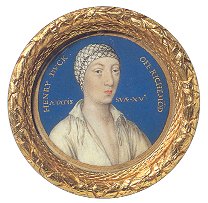 Today marks the aniversary of the death of Henry Fitzroy, Duke of Richmond and Somerset, at St James’s Palace, London. The seventeen year-old duke was the illegitimate son of Henry VIII, by his mistress Elizabeth (Bessie Blount), and the husband of Mary Howard, daughter of Thomas Howard, 3rd Duke of Norfolk. It is thought that he died of some kind of pulmonary infection, such as tuberculosis (consumption). He had been well enough to attend Anne Boleyn’s execution in May 1536 and Parliament on 8 June 1536, but was recorded as being ill on 8 July 1536 in a letter from Eustace Chapuys, the imperial ambassador, to Charles V. Chapuys wrote: “the duke of Richmond, who, in the judgment of physicians is consumptive (tysique), and incurable.”
Today marks the aniversary of the death of Henry Fitzroy, Duke of Richmond and Somerset, at St James’s Palace, London. The seventeen year-old duke was the illegitimate son of Henry VIII, by his mistress Elizabeth (Bessie Blount), and the husband of Mary Howard, daughter of Thomas Howard, 3rd Duke of Norfolk. It is thought that he died of some kind of pulmonary infection, such as tuberculosis (consumption). He had been well enough to attend Anne Boleyn’s execution in May 1536 and Parliament on 8 June 1536, but was recorded as being ill on 8 July 1536 in a letter from Eustace Chapuys, the imperial ambassador, to Charles V. Chapuys wrote: “the duke of Richmond, who, in the judgment of physicians is consumptive (tysique), and incurable.”
Henry VIII, who must have been grief-stricken at the death of his only son, left the burial arrangements to Fitzroy’s father-in-law. Norfolk arranged for Fitzroy to be buried at Thetford Priory in Norfolk. His remains were later moved to St Michael’s Church, Framlingham, Suffolk, due to the dissolution of the priory, and he was joined there by his wife, Mary, after her death in 1557.
You can read more about Fitzroy in Sarah Bryson’s article over at the Tudor Society – click here.
Notes and Sources
- Letters and Papers, Foreign and Domestic, Henry VIII, Volume 11: 40